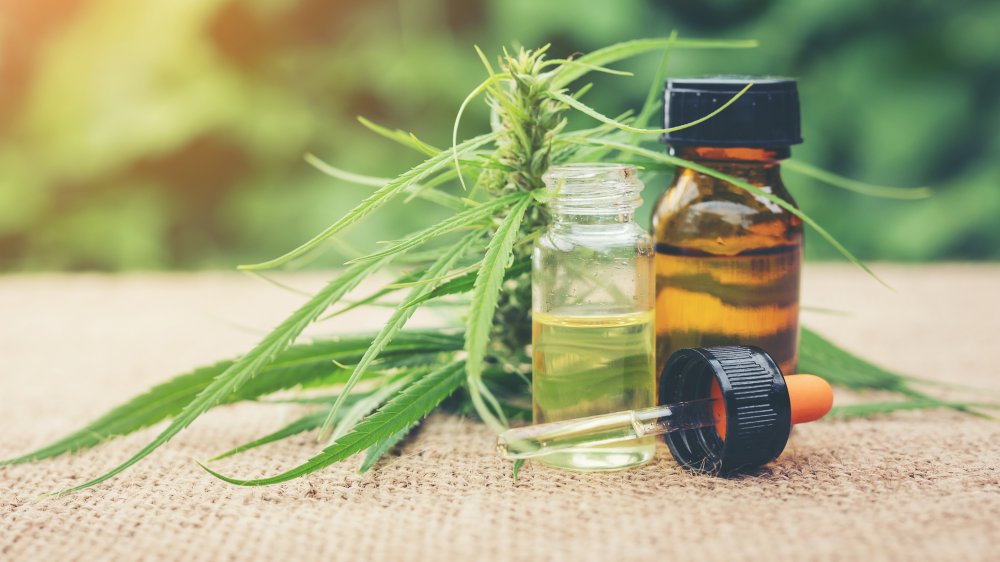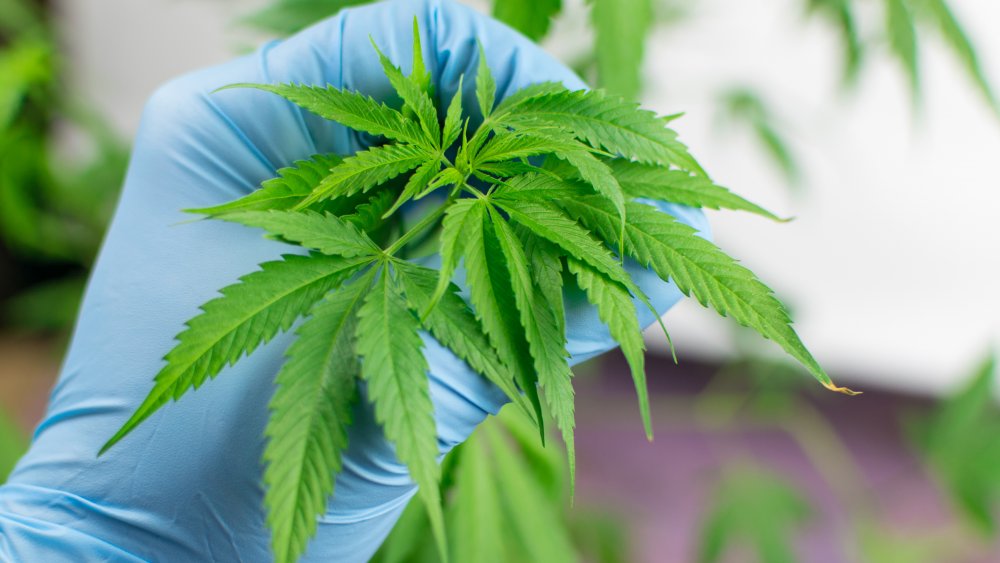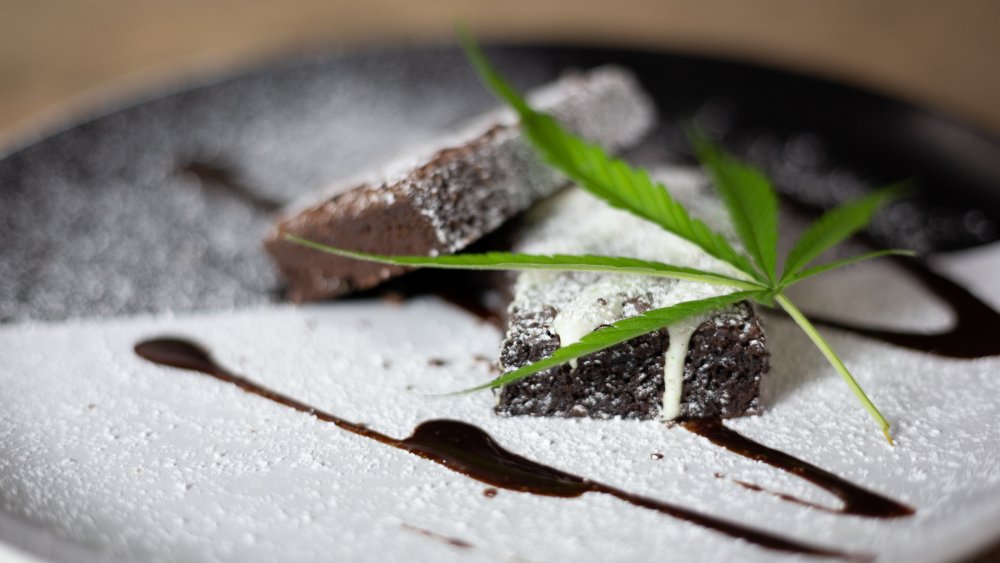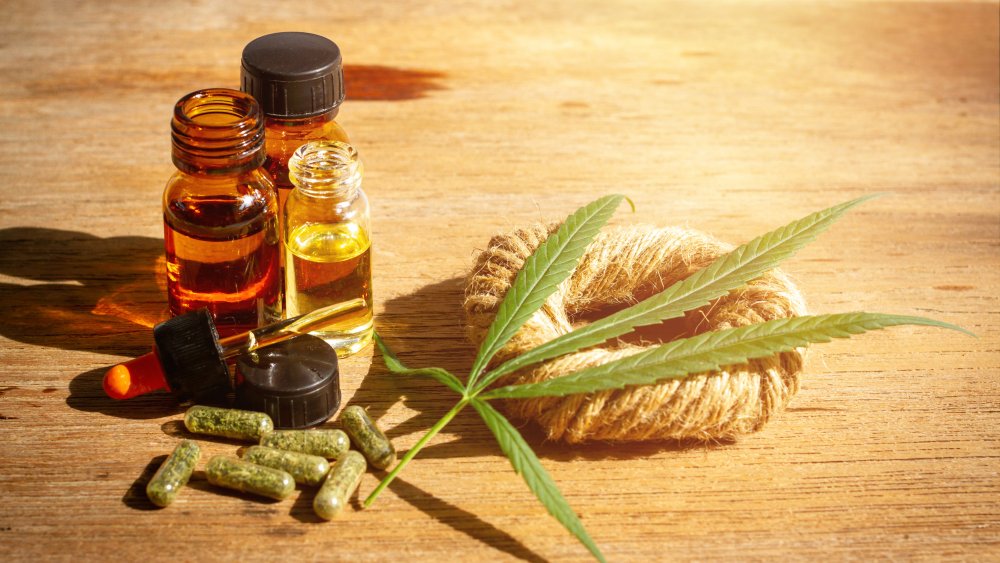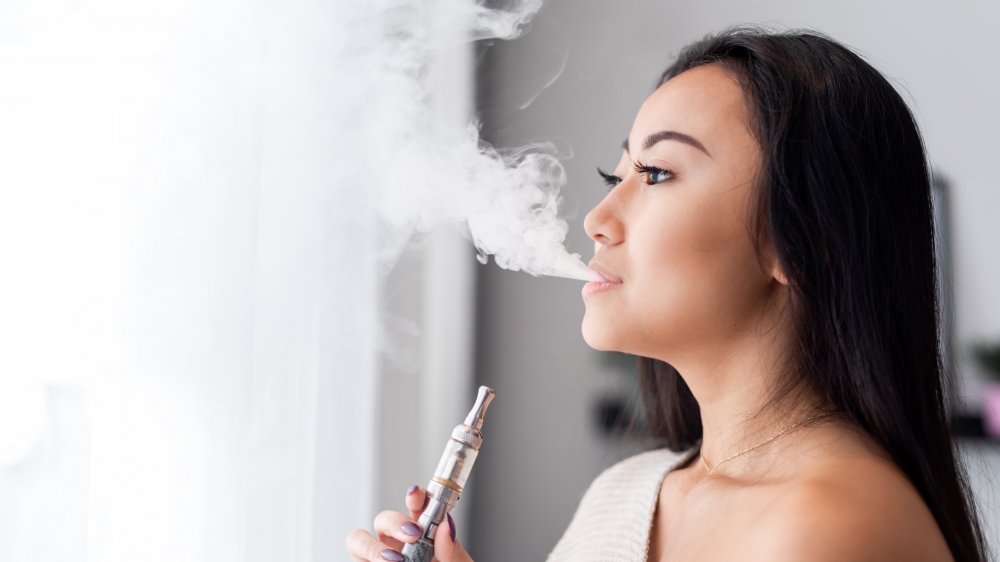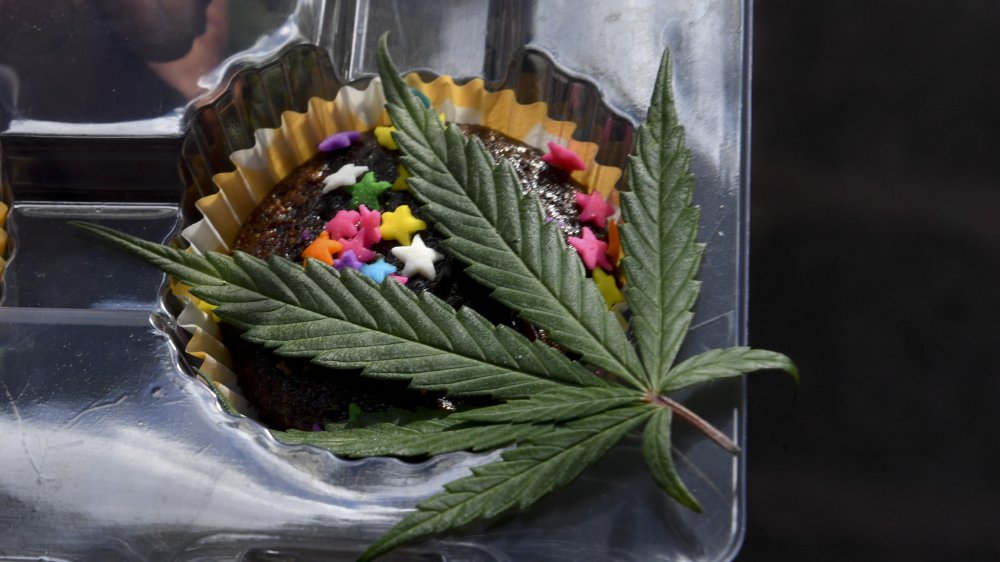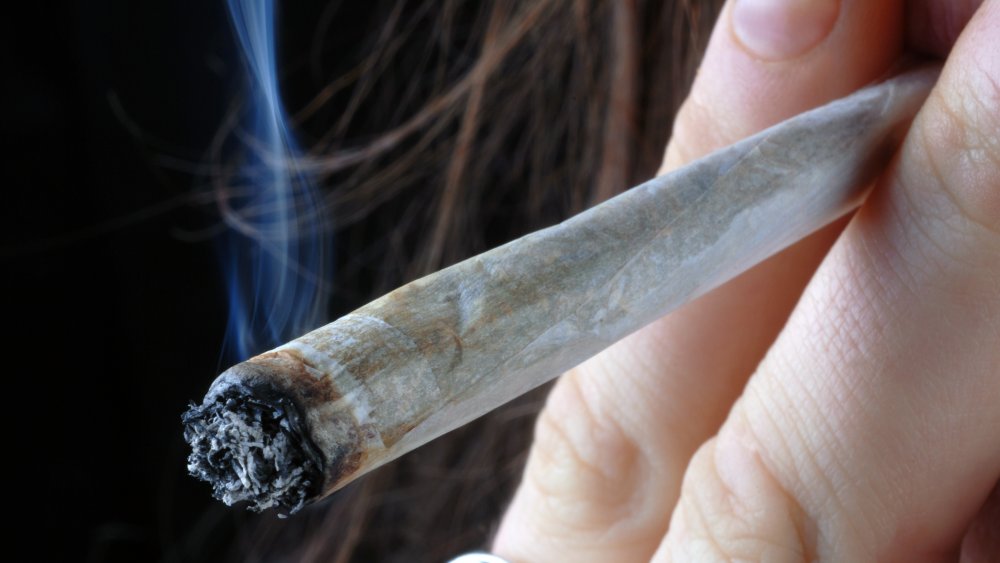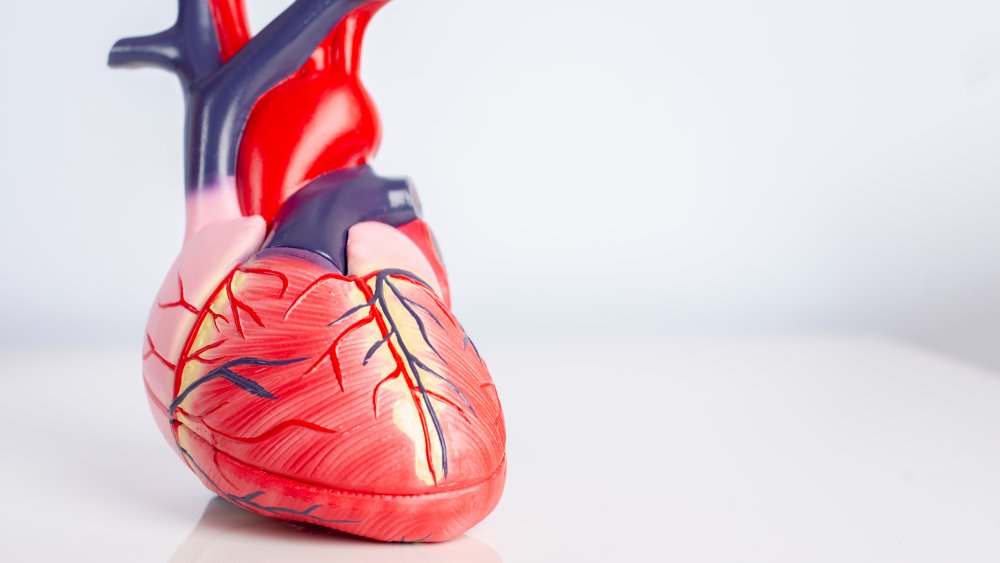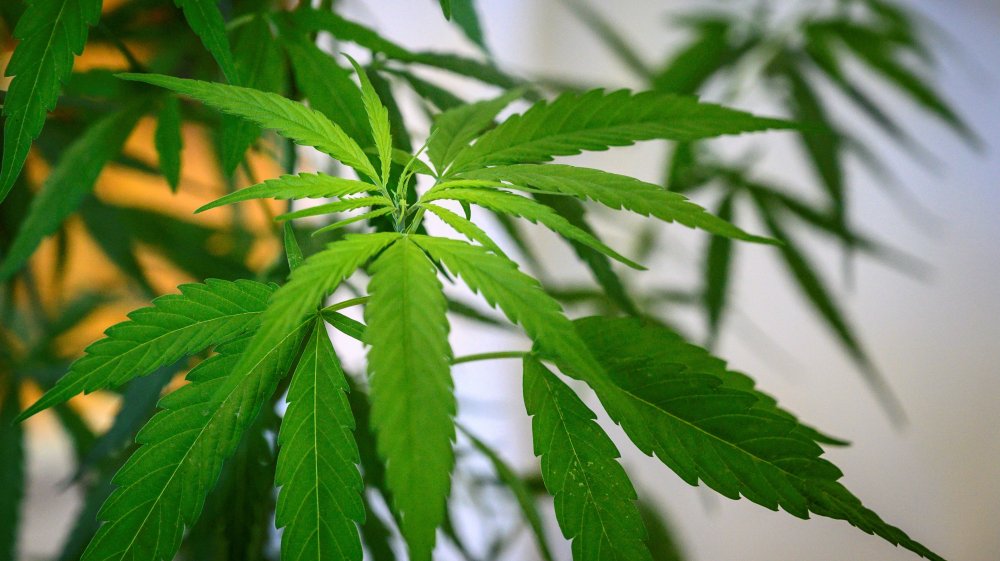What Happens To Your Body When You Ingest Cannabis Every Day
The number of American adults who ingest cannabis every day is on the rise, according to a study by researchers at Columbia University's Mailman School of Public Health (via ScienceDaily). Thanks to legislation that has decriminalized both medical and recreational marijuana in many states, cannabis is legally and widely available to millions of people who use the substance for a variety of reasons.
In addition to cannabis becoming increasingly more available, the ways in which you can ingest cannabis seem to be growing every day; you can smoke it, vape its oils, drop it under your tongue in a tincture, ingest it in edible form, or brew it as tea, according to the CDC. Depending on what you're using it for, one method may be better than another, so your mileage may vary.
If you're someone who ingests cannabis every day, chances are you're wondering if it's safe. So, without further ado, here's what happens to your body when you make ingesting cannabis a daily activity.
How you ingest cannabis every day makes a difference
Have you ever noticed that you feel the effects of smoking cannabis right away, but it takes a long time for your edibles to kick in? Also, have you ever wondered why the effects of edibles last much longer than those of smoking cannabis? Well, there's a reason for that, as noted by Nick Jikomes, the principal research scientist at Leafly.
"The issue isn't that [weed is] metabolized differently," he told Vice. "It's that it's gonna get metabolized to different degrees in different parts of the body, depending on the route of administration."
Specifically, the way you feel after you ingest cannabis and how long it takes you to get there can vary. That's due to how you process cannabinoid and terpenes, according to Jay Denniston, an analytical chemist. "Psychoactivity and the effects of cannabis depend not only on the cannabinoids," he explained to the publication, "but on the terpene levels, on the individual metabolite of the person, on what that person had already eaten that day; it depends on the setting." Clearly there's a lot at play!
You'll get high if you ingest cannabis every day
Let's face it: one of the biggest reasons people ingest cannabis every day is because it creates a high. That's thanks mostly to one particular substance in the plant, according to Thorsten Rudroff, an assistant professor at the University of Iowa. "THC [tetrahydrocannabinol] is the most psychoactive compound," he shared in an interview with Greatist. "When you smoke cannabis, THC gives you the high feeling. The more THC you have, the more powerful the high."
If you notice that you feel especially happy and giggly after ingesting cannabis, that's also due to the THC, as noted by Beatriz Carlini, an affiliate associate professor and research scientist at the University of Washington. "All those different sensations that people who use marijuana recreationally describe ... are because of the THC," she added. "It also increases dopamine levels, creating that sense of euphoria."
You'll have an easier time relaxing if you ingest cannabis every day
According to a poll by Yahoo! News and Marist College, 37 percent of people who ingest cannabis say that the reason for doing so is to help them relax. That's not surprising, as there's a good chance it can help calm you down, according to Ziva Cooper, an associate professor at Columbia University.
"People report that they take it to relax, so it's natural to conclude that cannabis might help with anxiety," she explained in an interview with Reader's Digest. She added, however, that more research is needed. Cannabis has not been legal for very long, so the scientific information available on the substance is limited.
Still, not everyone will find it relaxing to ingest cannabis every day. Some people may find that it exacerbates their anxiety, according to a study published in the Recent Patents on CNS Drug Discovery. Additionally, you should talk to your doctor to make sure you don't develop a cannabis use disorder, as that's not uncommon in users with an anxiety disorder.
If you ingest cannabis every day, you may sleep easier
Approximately 60 million Americans struggle with a sleep disorder such as insomnia. If you're included in this statistic and are looking for a natural way to combat insomnia, you may want to ingest cannabis every day before bed. Yes, it can help, as concluded by Michael J. Breus, a clinical psychologist, diplomate of the American Board of Sleep Medicine, and fellow of the American Academy of Sleep Medicine.
"Cannabis makes falling asleep easier," he penned in an article in Psychology Today. "One recent study found that cannabis shortens the time it takes to fall asleep, both for people with sleep problems and people who fall asleep without trouble." That's good news for folks who are tired of being tired, but are unable to catch some shut-eye.
But wait! There's more. It wasn't just one study that came to this conclusion. "This research aligns with other studies that show cannabis use reduces the time it takes to fall asleep, and lengthens time spent in deep, slow wave sleep," he continued. "Cannabis also appears to shorten time spent in REM sleep, likely as a result of one of its primary active ingredients, THC."
If you ingest cannabis every day, your memory may temporarily falter
Have you ever noticed that when you ingest cannabis every day, you have a hard time remembering where you left something, or what you were doing a few minutes ago? Well, there's a reason for that. Cannabis can have an impact on your short-term memory, according to Harvard Medical School.
It can also affect your executive function, thinking, and psychomotor function (like your ability to drive a car) temporarily, due to the way THC attaches to specific regions of the brain. As for long-term impacts, they're not known, though research involving rats has shown that there might be negative impacts, according to Medical News Today.
Additionally, while a study in The Journal of Neuroscience found no difference between the brains of cannabis users and non-users, there is definitive evidence that cannabis is bad for the developing brain. That means that ingesting cannabis when you're younger can cause permanent changes. The same is the case for pregnant people, as cannabis can affect the development of the fetus.
Looking to stimulate your appetite? Ingest cannabis every day
If you ingest cannabis every day, chances are you've experienced "the munchies," which is when your appetite increases and you're suddenly on the prowl for some chips, cookies, or other kind of snacks. That's a common experience, as the THC in cannabis stimulates your desire for food, according to a study in the journal Appetite. Specifically, the researchers found that a group of adult men who smoked marijuana snacked more frequently and consumed more food than the control group. They also found that the cannabis users gained more weight than expected by calories alone.
While that isn't necessarily good news for folks who are trying to maintain or lose weight, it's pretty great news for individuals with appetite issues, according to Science Daily. That's because appetite loss, which is a common result of many illnesses (HIV/AIDS, heart disease, cancer, etc.), can slow down recovery and have a negative impact on quality of life. Fortunately, it looks like cannabis can help such ones recover their desire to eat!
If you want to treat a chronic disease, you may want to ingest cannabis every day
According to Everyday Health, ingesting cannabis every day can help with a variety of symptoms, such as nausea relief for cancer patients, decreasing the inflammation of Crohn's disease and arthritis, and spasticity related to multiple sclerosis. Additionally, the Food and Drug Administration (FDA) has approved a drug that contains cannabis that helps children who have seizures and/or severe epilepsy.
That's not all either, as the Mayo Clinic has identified a number of diseases and conditions that can be treated with cannabis, such as Alzheimer's disease, Lou Gehrig's disease (also known as amyotrophic lateral sclerosis, or ALS), and glaucoma. Furthermore, depending on the state in which you live, there may be even more conditions that warrant access to medical marijuana. For example, in California, residents can legally use cannabis to treats migraines whereas in Hawaii, it's approved for the treatment of lupus.
If you ingest cannabis every day, you may experience less chronic pain
If you ingest cannabis every day, you may find yourself better able to manage chronic pain, as noted by physician Peter Grinspoon. "The most common use for medical marijuana in the United States is for pain control," he wrote in an article for Harvard Medical School. "While marijuana isn't strong enough for severe pain (for example, post-surgical pain or a broken bone), it is quite effective for the chronic pain that plagues millions of Americans, especially as they age." He added that it's especially good at tackling nerve pain as well as pain caused by endometriosis. It may even lessen tremors due to Parkinson's disease.
There's a good reason that cannabis is so popular for treating pain as well, according to Grinspoon. "Part of its allure is that it is clearly safer than opiates (it is impossible to overdose on and far less addictive)," he revealed. "And it can take the place of NSAIDs such as Advil or Aleve, if people can't take them due to problems with their kidneys or ulcers or GERD."
If you ingest cannabis every day, you may become dependent
The decision to ingest cannabis every day can be a good one for your health, but there are still some adverse effects that come along with daily use. For one, it could put you at risk for dependence, as noted by Sal Raichbach, director of clinical services at Ambrosia Treatment Center.
"While marijuana isn't addictive in the same sense as drugs like heroin or meth, daily use can turn into a habit and eventually into a dependency," he told The List. "Cannabis Use Disorder (CUD) is a real diagnosis according to the American Psychiatric Association, and it's probably more common than most people assume."
Additionally, Raichbach is concerned not just about frequency of use, but also the changing makeup of cannabis products. "It's especially concerning because the potency of marijuana is increasing faster than researchers can study the effects and potential dangers," he continued. "This leads to decreased reactivity to dopamine, which suggests a possible correlation to the dampening of the reward system of the brain and an increase in negative emotion and addiction severity."
You can become temporarily paranoid if you ingest too much cannabis every day
Have you ever had the experience of ingesting cannabis, and suddenly feeling like someone or something was out to get you? Or perhaps you were smoking marijuana with friends, and you started to think that they secretly didn't like you? That would be due to the THC content in cannabis, according to Healthline, as consuming too much of it can make you temporarily paranoid. This can especially be an issue with edible products like confections, candies, and gummies, as they last longer, tend to have a high THC content, and are all too easy to overconsume.
Mike Tagen, a scientific consultant for cannabis companies who has a background in pharmacology, told The Atlantic that the THC content in edibles is "more like the synthetic cannabinoids." He continued, "Those are associated with bad reactions, things like anxiety attacks, paranoia. That might be why you see the strong reaction with edibles."
If you find yourself prone to experiencing unpleasant paranoia when you consume edibles, you may want to find an alternative way to ingest cannabis every day. That way you can better control how much THC you take in and avoid overdoing it.
Your mental health may be impacted if you ingest cannabis every day
In rare instances, the THC in cannabis can cause psychosis, with symptoms like confusion, paranoid delusions, hallucinations, and extreme sedation, according to Healthline. It can also put you at a higher risk for developing schizophrenia, which is deeply concerning to Fiona Clement, a health-policy researcher at the University of Calgary's Cummings School of Medicine in Canada.
"It should give us pause," she cautioned in an interview with Nature. "We may not understand exactly the relationship between cannabis and these psychosis-related mental illnesses, but there's definitely something there."
While it could be that people who are predisposed to psychosis may be more likely to ingest cannabis, it's looking more and more likely that cannabis itself has more of a causal role. The ingestion of especially high THC strains may indeed bring with it a greater risk of developing psychotic symptoms, but more research is needed to precisely understand the mechanisms at work.
If you ingest cannabis every day through smoking, you risk damaging your lungs
If you ingest cannabis every day, you may be putting your physical health at risk. This is especially the case if you smoke it, as you could be putting your lungs at risk, noted David Tom Cooke, a spokesperson for the American Lung Association. "Marijuana contains chemical substances that can absolutely cause damage to your lungs," he shared in a chat with Parade. "It's just common sense: Marijuana contains chemicals like toxic, unregulated gas, and when you inhale it, that can damage human lung tissue." That sounds pretty similar to the impacts of cigarette smoking or vaping.
While it may help you relax or make you feel euphoric, unfortunately smoking marijuana every day can make you more prone to serious lung problems. "You can develop bronchial conditions as a result, especially if your immune system is compromised by another illness or condition," Cooke continued. "Lung infections can become a problem as well." Yikes!
You may develop heart problems if you ingest cannabis every day
Sorry, cannabis aficionados, there's some more bad news about your favorite plant: Ingesting cannabis every day might not be the best thing for your ticker, according to the CDC. For one, ingesting cannabis could elevate your heart rate, causing it to work more than it usually has to. Secondly, it's possible that your daily cannabis habit might put you more at risk of both stroke and heart disease, which isn't good news.
It's not all doom and gloom for your cardiovascular health, however. That's because the CDC says the data collected on these conditions were all reported by people who specifically smoked marijuana as opposed to ingesting it in edible form. That made it difficult for researchers to parse out what's causing the adverse health impacts, which could have been from the toxic nature of the smoke. It could be that brownies or cookies made with cannabis are better for your heart, but more research is needed to know for sure.
One thing is certain, though: If you have heart disease, you should avoid cannabis altogether, according to Harvard Medical School.
More research is needed to truly understand what happens to your body when you ingest cannabis every day
The truth of the matter is this: More research is needed in order to fully understand what happens to your body when you ingest cannabis every day. Once people are properly informed via legit scientific studies, they can make better choices, noted Andrew Monte, an emergency physician and medical toxicologist at the University of Colorado. "I believe strongly that there are benefits to cannabinoids for medical purposes," he proclaimed in an interview with Nature. "And I believe that many thousands of people use cannabis safely." That's pretty encouraging!
It's also vital to have a balanced perspective on cannabis, as it's just like any other drug available on the market, says Monte. "Cannabis is not the root of all evil, nor is it the cure for all diseases," he added. "You've got to understand what the good is and what the bad is, and then make a balanced decision."
